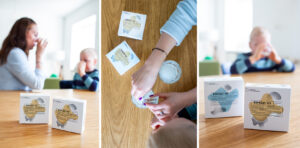
Joanna Baranowska: Często pokutuje wadliwe przekonanie, że dziecko musi poczuć, że źle robi, i zapłacić za swój błąd, a wystarczy, żeby w trudnej dla niego sytuacji poczuło się lepiej
Monika Głuska-Durenkamp: Skąd wzięło się twoje zainteresowanie „Pozytywną Dyscypliną”?
Joanna Baranowska: W 2012 roku miałam kilkumiesięczną córkę oraz dwulatka i trochę typowych dla dziecka w tym wieku kłopotów. Zajmowałam się wtedy coachingiem dla mam. Jedna z moich klientek powiedziała do mnie: „Ty musisz zajmować się 'Pozytywną Dyscypliną’”. Kiedy usłyszałam, że coś muszę, od razu włosy stanęły mi dęba, bo wtedy nie miałam czasu na nic więcej! Ale dała mi materiały i dodała: „Przejrzyj”. To był skrypt po angielsku i w miarę czytania miałam rosnące poczucie, że wszystko mi się układa w głowie. Zaczęłam rozumieć, co dzieje się z moim synem.
W jaki sposób tłumaczy to „Pozytywna Dyscyplina”?
Opisywała choćby to, że dzieci zachowują się źle, kiedy czują się źle. Małe dziecko bywa niegrzeczne, krzyczy, nie dlatego, że sobie to wymyśliło, czy że robi nam na złość. Ono samo nie rozumie, co się z nim dzieje, fizycznie i psychicznie. Nieznośny dwulatek jest zaskoczony tym, co czuje. Dostaje cały pakiet emocji, także złość, ale nie ma dostępu do myśli, że histeria nie jest akceptowalnym kulturowo sposobem rozładowania złości. Dlatego dla malucha jest najlepszym, bo dostępnym rozwiązaniem. Do około drugiego roku życia dzieci nie umieją opisać co się z nimi dzieje. To związane jest z rozwojem mózgu, szczególnie kory nowej odpowiedzialnej za racjonalne myślenie i mowę, i kory przedczołowej za samoregulację. W „Pozytywnej Dyscyplinie” taki kontekst jest brany pod uwagę. Gdy więc dwulatek jest nieznośny, pamiętam o dwóch kwestiach. Po pierwsze, stres powoduje, że trudno zachować nam racjonalne podejście.
Po drugie dwulatek dopiero uczy się, czym jest racjonalne podejście. Dlatego jako rodzic nie oczekuję od niego racjonalnego zachowania. Za to mogę mu pomóc wyciszyć się, czyli poczuć się lepiej, by zachowywał się lepiej.
Co jako rodzice możemy robić?
Rolą dorosłych jest pomaganie dziecku w tym, żeby zachowywało się dobrze. W „Pozytywnej Dyscyplinie” uderzyła mnie prostota narzędzi, którymi możemy to osiągnąć. Dostarcza ona rodzicom gotowych technik do pracy nad sobą i do pracy z dzieckiem. To proste rzeczy zgodne z tym, jak działa w danym wieku mózg. W „Pozytywnej Dyscyplinie” staramy się pamiętać o tym, co chcemy osiągnąć długofalowo. Wszystkie narzędzia „Pozytywnej Dyscypliny” pomagają rozwinąć w dziecku kompetencje takie, jak samodzielność, komunikatywność, kreatywność.
Często pokutuje wadliwe przekonanie, że dziecko musi poczuć, że źle robi, i zapłacić za swój błąd, przepraszać, a wystarczy, żeby dziecko w trudnej dla niego sytuacji poczuło się lepiej.
Na przykład przed spacerem, gdy marudzi, zamiast denerwować się i walczyć z nim, po prostu dać mu wybór. „Hej, wychodzimy na spacer, więc wybierz buty, w których chcesz wyjść”, „Wolisz śniegowce czy kalosze?”. Jeśli trudno mu się uspokoić, zawsze warto zauważyć jego emocje i nazwać to, co być może się z nim dzieje. „Jest ci smutno, że przerywasz zabawę, tak? Może przytulimy się teraz, szybko zrobimy zakupy i wrócisz do swoich klocków, ok?”.
Ale rodzice boją się, że dawanie możliwości wyboru to pozwolenie dziecku na coś więcej, rozpuszczanie…
To błędne myślenie, a dawanie wyboru jest bardzo ważne. Odpowiedź, które chce buty, jaki jogurt woli, pozwalają dziecku uczyć się podejmować decyzje. Gdy zadajemy dziecku pytanie, okazujemy mu, że jest ważne, i pomagamy znaleźć użyteczne dla wszystkich rozwiązanie. Pomagamy mu poczuć łączność i przynależność, zrozumieć, że jest ważne w rodzinie i w społeczności.
Co możemy zyskać?
Równowagę między dziećmi a rodzicami. Popadanie w skrajności nigdy nie jest dobre, ani same zakazy, ani gdy rodzic ulega i zawsze ustępuje w imię dobrego samopoczucia dziecka. To nikomu nie pomaga. W tej metodzie ważne jest dbanie o szacunek do rodzica, jak i dziecka.
Co unikalnego jest w tej metodzie?
Unikalne jest właśnie szukanie równowagi między potrzebami rodzica a dziecka. Rodzic decyduje o pewnych szerszych granicach działania dziecka, pozostając liderem w rodzinie. Jednocześnie negocjuje granice z dzieckiem, pomaga mu zrozumieć konsekwencje swoich działań, jest obok i wspiera malucha stającego w obliczu nowych życiowych wyzwań. Jest to dalekie od wyręczania czy też usuwania z drogi dziecka wszystkich trudnych sytuacji. Raczej zastanawiamy się, jakich umiejętności potrzebuje dziecko, by poradzić sobie z kolejnymi wyzwaniami i oswajać je z nimi stopniowo.
Często słyszy się, że złymi zachowaniami dzieci zwracają na siebie uwagę. Czy tak rzeczywiście jest?
Tak, znam to pytanie. Rodzice często pytają, czy dawanie uwagi źle zachowującemu się dziecku pomoże mu zachowywać się lepiej, czy wzmocni złe zachowanie. W „Pozytywnej Dyscyplinie” uważamy, że zachowania, których celem jest skupianie na sobie uwagi (pozytywne i negatywne zachowania), są wierzchołkiem góry lodowej.
Podstawą problemu jest potrzeba przynależności i znaczenia. Odpowiedzią na poszukiwanie uwagi przez dziecko jest wzmocnienie jego potrzeby przynależności. Możemy zaangażować je do pomocy, przytulić, albo umówić się na wspólną zabawę.
Jeśli będziemy skupiać się na zachowaniu, to prawdopodobnie wzmocnimy w nim podświadome przekonanie, że jest ważne tylko wtedy, gdy dostaje uwagę dorosłego. W „Pozytywnej Dyscyplinie” chcemy żeby czuło, że jest zawsze ważne. Dlatego tak znaczące jest budowanie poczucia przynależności i znaczenia poprzez to, co wnosi w społeczność, jaką jest rodzina. Dzieje się tak na przykład wtedy, gdy dwulatek może sam przynieść z kuchni kubeczek, nalać do niego wody. Jeśli wyleje po drodze, zamiast zwracać uwagę typu „Znów rozlałeś”, prosimy, żeby wziął szmatkę i wytarł. Delikatnie i z czułością wymagamy od niego, podsuwając rozwiązanie. Dzieci chętnie w to wchodzą, a to najlepsza okazja na rozwinięcie kompetencji. Gdy młodsza siostra płacze, to starsze rodzeństwo może iść ją przytulić, pocieszyć. Dziecko uczy się wtedy być empatyczne i czuje się ważnym członkiem rodziny.
Wyobraźmy sobie sytuację: dziecko leży już w łóżeczku wieczorem. Przeczytaliśmy razem już kilka książeczek. Mówimy „dobranoc”, dajemy buziaka i wychodzimy z pokoju. Dziecko woła nas. Idziemy raz, drugi, trzeci… Po 10 stajemy się zniecierpliwieni, bo chcemy już chwili spokoju…
„Pozytywna Dyscyplina” mówi, że nasze potrzeby też muszą być zaspokojone. Dziecko komunikuje, że chce uwagi, poczuć się ważne. A my staramy się, jak już wspominałam, żeby zawsze tak było. Nadmierna uwaga, opiekuńczość, po raz setny owijanie kocykiem, nikomu nie służy (dziecko czuje rosnącą ze zmęczeniem bezsilność). Staramy się o balans. W takim wypadku dobrze jest obserwować swoją frustrację i zastanowić się, co zrobić, by uporządkować wspólne wieczory. Być może ten dzisiejszy będzie wyglądał tak jak zwykle i nic już nie zdziałamy, ale następnego dnia warto zacząć rozmowę z dzieckiem o tym, jak może wyglądać plan wieczoru.
Dzieci chętnie powiedzą, co robią, mogą z pomocą dorosłego narysować swój plan i próbować się go trzymać. Dajmy dziecku wybór: „Czytamy dziś 2 czy 3 bajki?”. Wzmacniajmy je pytając, czego potrzebuje, by trzymać się planu wieczoru, który współtworzyło.
Mówmy o swoich potrzebach i tym, co robimy np.: „Teraz dam ci buziaka i pójdę zrobić sobie herbatę, wrócę za kilka minut na jeszcze jednego przytulasa”. Jestem zwolenniczką wprowadzania stopniowych zmian. Działania zdecydowanie i z wyczuciem.
W jaki sposób zasady „Pozytywnej Dyscypliny” działają w przypadku starszych dzieci, na przykład kiedy chcemy namówić je do nauki, odrabiania lekcji?
Zasady są takie same. Każda mama chciałaby, żeby dziecko dobrze się uczyło. To normalne. Ja sama znam dobrze mojego syna i wiem, że gry i konsole są dla niego też ważne. Jako psycholog rozumiem, że przemysł komputerowy to także praca wykwalikowanych specjalistów. Dbają oni o to, żeby te gry wciągały. Dzieci mogą nie być gotowe, by samodzielnie oprzeć się takim pokusom. Tu nie pomogą groźby czy kary. Gdy mój syn zapomina o odrobieniu lekcji, staram się myśleć, czego potrzebuje, żeby czuł się bardziej odpowiedzialny i robił je sam, bez przymuszania. Konsekwentnie pytam, co miał na lekcjach, jak mu poszło. Staram się okazać mu wsparcie i wiarę w to, że da radę.
Stawiam mu pytania otwarte, które mają go trochę nakierować, popchnąć, żeby był bardziej uważniejszy, skoncentrowany, samodzielny i sam nabrał umiejętności uczenia się. Drugim ostatecznym narzędziem jest regulowanie dostępu do wszelkich ekranów. Kora nowa, odpowiedzialna za samokontrolę, dojrzewa około 25.-30. roku życia. Nie mogę oczekiwać, że dziesięciolatek wygra w walce z korporacjami budującymi coraz bardziej angażujące gry i media społecznościowe. I to nie jego wina.
Kiedy i gdzie powstała „Pozytywna Dyscyplina”?
To jedna z klasycznych metod wychowawczych, która rozwija się od niemal 40 lat. Ale jej korzenie sięgają jeszcze głębiej, do psychologii indywidualnej tworzonej przez austriackiego psychoterapeuty Alfreda Adlera. On, jako jeden z pierwszych, zainteresował się jednostką w szerszym kontekście społecznym. Uważał, że wszyscy ludzie mają jedno podstawowe pragnienie: chcą czuć, że przynależą i że są ważni. W latach 80. koncepcje rozwinęły Lynn Lott i Jane Nelsen. W 1981 roku Jane Nelsen napisała i własnym sumptem opublikowała książkę Positive Discipline („Pozytywna Dyscyplina”).
Rok później Jane i Lynn zdecydowały się na współpracę przy książce „Pozytywna Dyscyplina dla nastolatków” i zaczęły wspólnie prowadzić warsztaty empirycznego przyswajania umiejętności wychowawczych dla rodziców i nauczycieli. Niedługo później napisały „Pozytywną Dyscyplinę w klasie” i stworzyły podręcznik z mnóstwem empirycznych ćwiczeń dla nauczycieli i ich uczniów. W kolejnych latach seria „Pozytywna Dyscyplina” wzbogaciła się o wiele pozycji, które powstały z myślą o różnych grupach wiekowych, kontekstach rodzinnych i szczególnych potrzebach.
Zajmujesz się także rozpowszechnianiem „Pozytywnej Dyscypliny”, szkoleniem i certyfikacją edukatorów, gdzie można ich znaleźć?
Kilka lat temu, wraz z trzema mamami także zafascynowanymi „Pozytywną Dyscyplinę”, zaczęłyśmy współpracę. Naszym marzeniem jest, aby ją przybliżyć wszystkim rodzicom, nauczycielom i osobom pracującym z dziećmi w Polsce, w szkołach. I to się udaje. Prowadzimy szkolenia, warsztaty, certyfikujemy edukatorów. Jeśli chcą państwo porozmawiać, dowiedzieć się więcej, czy pójść na warsztat, to warto poszukać edukatorów w swojej okolicy. Nieraz pracują przy bibliotekach, ośrodkach pomocy społecznej, poradniach pedagogiczno- psychologicznych.
Każdy rodzic może sprawdzić, czy przemawia do niego podejście „Pozytywnej Dyscypliny”, pobierając sobie za darmo fragment wybranej przez siebie książki. Wystarczy wejść na www.pozytywnadyscyplina.pl/1rozdzial







































